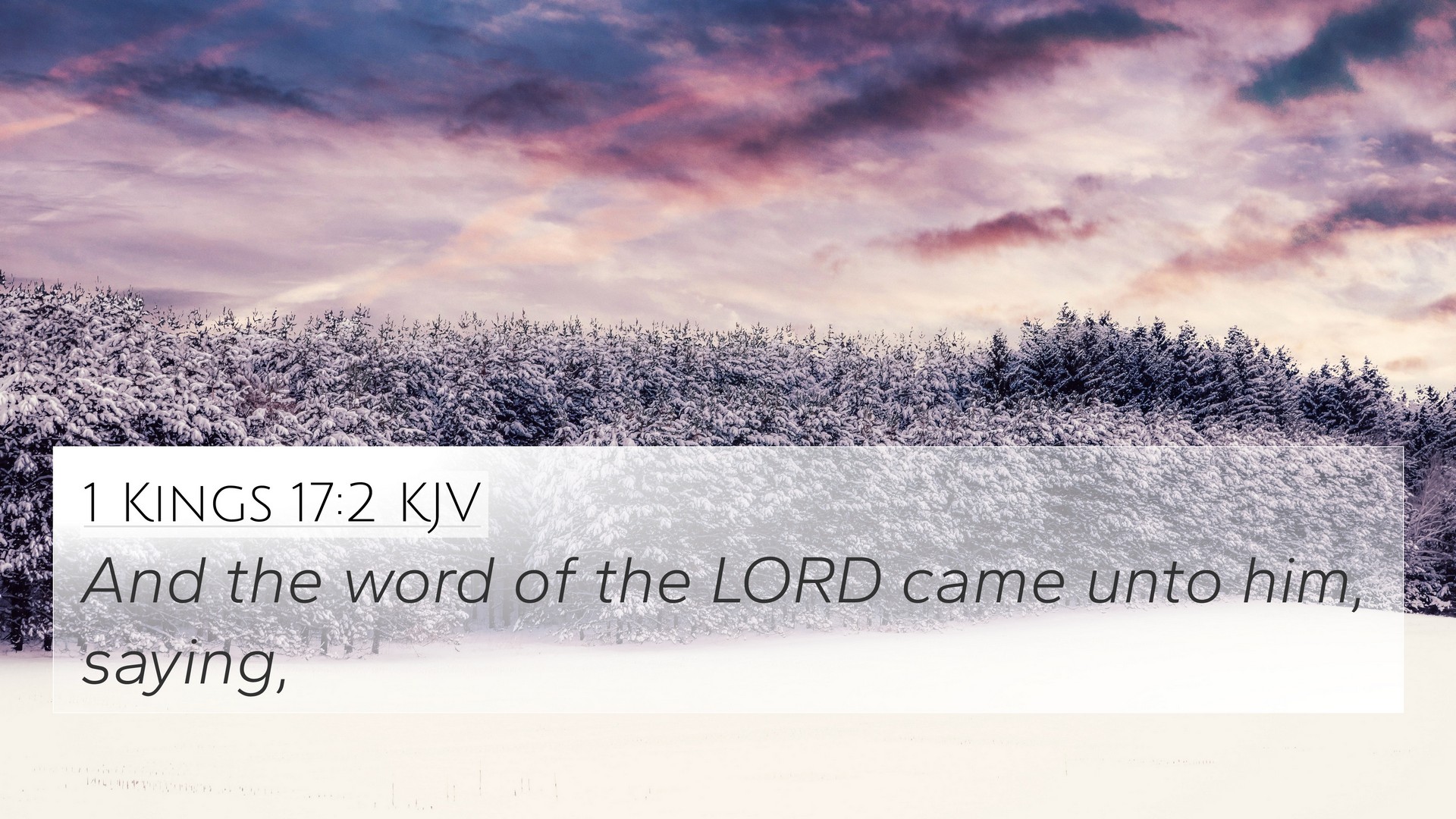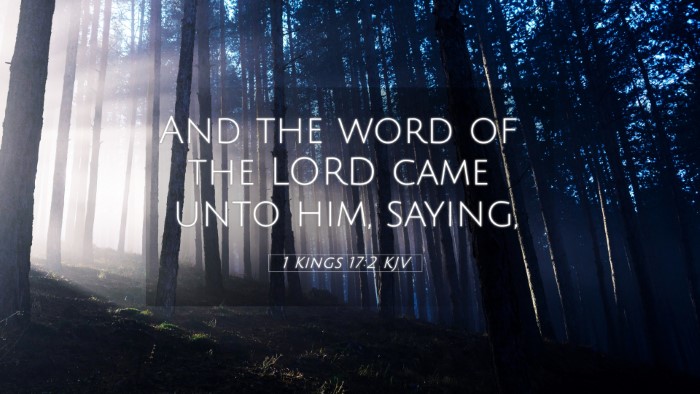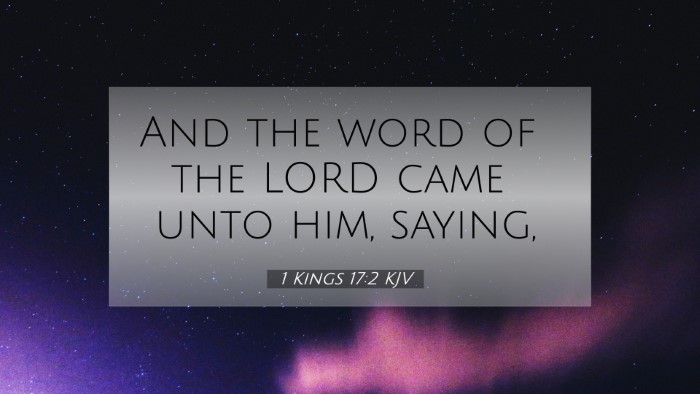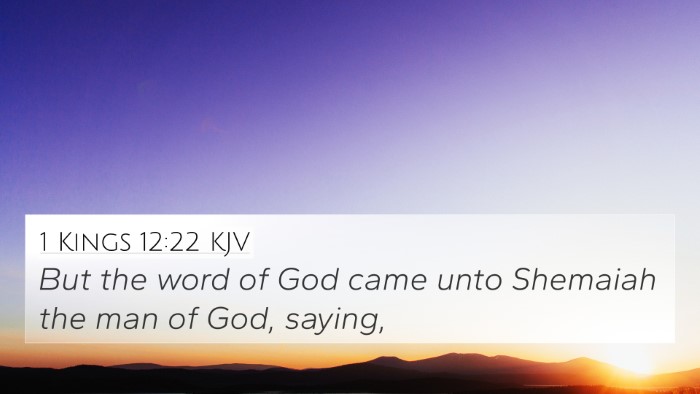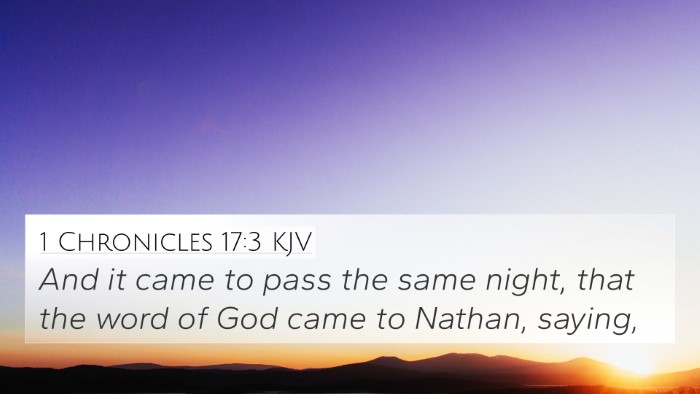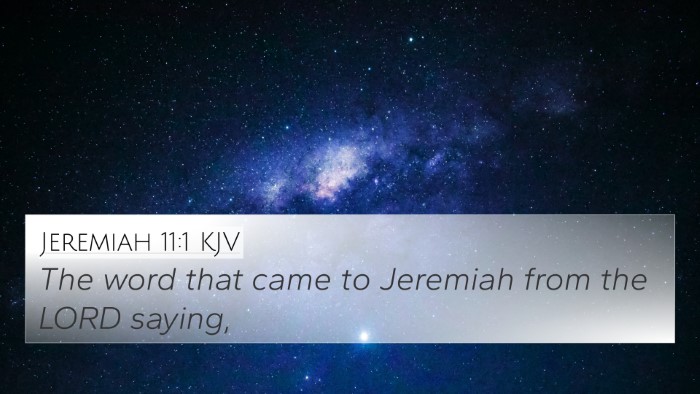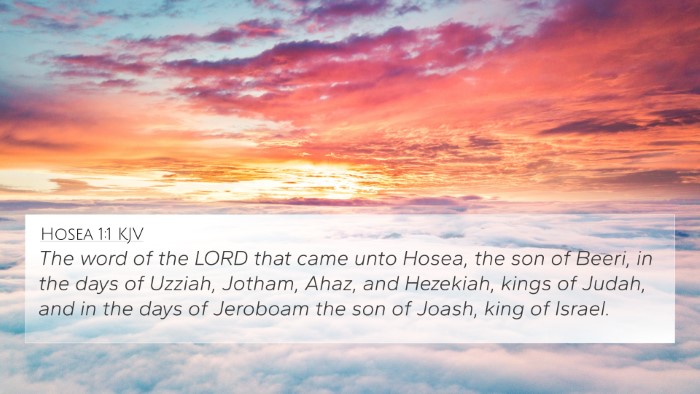Understanding 1 Kings 17:2
In 1 Kings 17:2, the scripture states: "And the word of the Lord came unto him, saying," which signifies a direct communication from God to Elijah. This moment underscores the profound relationship between God and His prophets, highlighting how divine guidance plays a crucial role in their ministries. This verse sets the stage for the dramatic events that unfold in Elijah's life, which is pivotal in the narrative of the Israelite people's confrontation with idolatry and their return to the worship of Yahweh. To gain a deeper understanding of this verse, let us explore the insights drawn from public domain commentaries such as those by Matthew Henry, Albert Barnes, and Adam Clarke.
Commentary Insights
-
Matthew Henry's Commentary:
Matthew Henry emphasizes the importance of God's word in the life of Elijah, noting that it signifies God's ongoing engagement with His people. He illustrates that the word of the Lord is not only crucial for guidance but is also a means of establishing the authority of the prophet. The command that follows this communication guides Elijah to exercise his prophetic role, which includes confronting King Ahab and addressing the spiritual crises of Israel.
-
Albert Barnes' Notes:
Albert Barnes reflects on the wider implications of receiving God's word. He comments on how divine communication brings clarity and direction. In this particular moment, God is calling Elijah to action, demonstrating that obedience to divine instruction is paramount. Barnes highlights that the sovereignty of God is evident in how He orchestrates events to fulfill His plans, suggesting that God's call to Elijah is both a privilege and a responsibility.
-
Adam Clarke's Commentary:
Adam Clarke discusses the context surrounding this verse, noting the historical backdrop of Israel's judgment due to idolatry. Clarke points out that Elijah's prophetic mission is crucial at a moment when the nation is straying from their covenant with God. The verse symbolizes a pivotal turning point where God chooses a messenger to deliver important messages to His people fostering repentance and a return to righteousness.
Cross-References and Thematic Connections
This verse is closely related to several other scriptures that illuminate the themes of divine communication, prophetic guidance, and the role of individuals in fulfilling God's will. Below is a selection of Bible verse cross-references that provide further insight:
- 1 Kings 17:1 - Establishes the beginning of Elijah's prophetic ministry and his role before Ahab.
- 1 Kings 18:1 - Continues the narrative of God’s communication to Elijah amid a drought, showing the ongoing dialogue.
- Jeremiah 1:7 - Reflects on God's calling of prophets and their necessity to speak His words.
- Ezekiel 2:1-7 - Highlights the calling and commissioning of the prophet, emphasizing the importance of obeying God's commands.
- Hebrews 1:1-2 - Discusses how God has spoken to His people through prophets in the past but ultimately through His Son in the New Covenant.
- Acts 3:22-23 - Connects the prophetic messages from the Old Testament and their fulfillment in Christ.
- Luke 4:25-26 - Jesus refers to Elijah, illustrating His recognition of the prophet's role during a time of crisis in Israel.
- James 5:17 - Mentions Elijah's prayers and the power of a righteous man's prayer, linking to the theme of prophetic efficacy.
- Malachi 4:5-6 - Foretells the coming of Elijah before the day of the Lord, further solidifying Elijah's significance in biblical prophecy.
- Matthew 17:3 - Refers to Elijah's appearance at the Transfiguration of Jesus, showcasing the enduring legacy of the prophet.
Exploring the Themes in 1 Kings 17:2
The verse encapsulates several key themes that resonate throughout Scripture, including:
-
Divine Communication:
God's initiative to speak to Elijah demonstrates His desire for relationship and guidance for His people.
-
Prophetic Authority:
Elijah’s role underscores the significance of prophets as instruments through which God's messages are delivered to His people.
-
Obedience and Action:
The command that follows this divine communication underscores the necessity of obedience to God's call, emphasizing that faith should manifest in action.
-
Judgment and Mercy:
The context of idolatry in Israel highlights God's judgment and the merciful call for repentance through prophetic voices.
Utilizing Cross-References in Bible Study
Understanding the connections between Bible verses enhances our grasp of theological concepts and provides a holistic view of biblical teaching. For those engaging in cross-reference Bible study, consider the following tools:
- Bible Concordance: Helps locate specific verses and their thematic relevance.
- Bible Cross-Reference Guide: Offers structured tables of references, making the process systematic.
- Comprehensive Bible Cross-Reference Materials: A collection of works that align scriptures thematically and contextually.
- Cross-Referencing Bible Study Methods: Techniques to explore connections between verses, enriching your study.
- Bible Reference Resources: Essential texts and commentaries for deeper exploration of topics and verses.
Conclusion
1 Kings 17:2 is a foundational verse that encapsulates the essence of God's call to His prophet, establishing a trajectory for understanding prophetic ministry in the Old Testament. Through cross-referencing with related scriptures, we can see a broader narrative of God's engagement with humanity and the pivotal role of prophets in guiding His people. This verse invites all believers to reflect on the importance of heeding God's voice and acting upon His word as they navigate their spiritual journeys.
